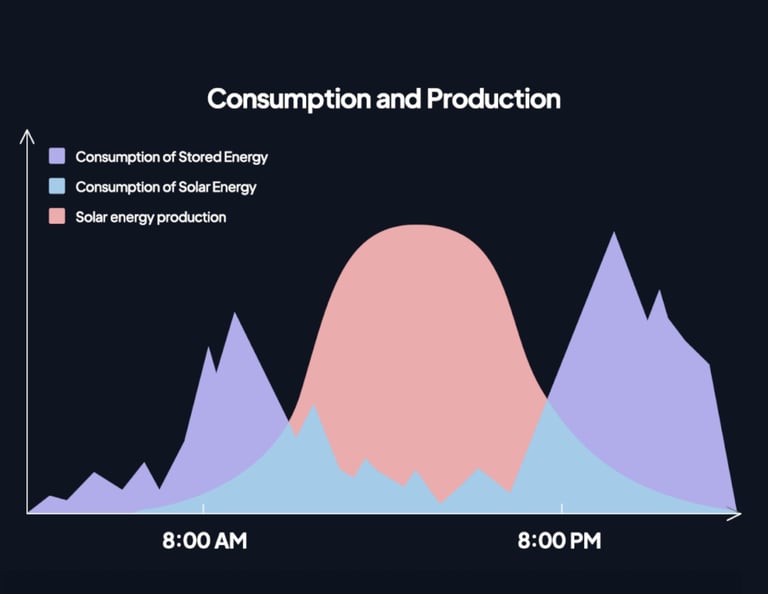🚀 Power Up Your Plug-and-Play Solar Journey – Introducing JET Battery Storage 🚀
The Power of Solar Batteries: Are They Worth the Investment?
A comprehensive overview of solar batteries and helps readers make informed decisions about their solar energy systems.
10/31/20233 min read
Reduced Grid Reliance: Solar batteries allow homeowners to store energy, reducing their dependence on the National Grid. This not only leads to cost savings but also promotes a more sustainable lifestyle.
Backup During Blackouts: Power outages can be a real inconvenience. With a solar battery, your home can have a backup power source during those unexpected blackouts.
Cost Savings: While there's an initial cost to installing a solar battery, the long-term savings can be significant. Electricity is charged on average at 35p per kWh during peak hours (4pm - 9pm). See the consumption and production chart below to get some ideas. By storing cheap energy and using or selling it when prices are high, homeowners can see a return on their investment.
Eco-Friendly: Using stored solar energy reduces your carbon footprint, making your home more sustainable and environmentally friendly.
Solar energy has been making waves in the renewable energy sector, and for a good reason. It's clean, sustainable, and with the right equipment, can power our homes day and night. One such piece of equipment that's been gaining traction is the solar battery. But are solar batteries worth the investment? Let's dive in.
What Are Solar Batteries?
Solar batteries are designed to store the excess energy generated by solar panels during the day. Without a battery, a significant portion of this energy goes unused. With a battery, homeowners can harness this energy, reducing their reliance on the National Grid and even leading to potential cost savings.
The Benefits of Going Solar (With a Battery)
Maximized Solar Consumption: With a solar battery, you can use the energy generated from your solar panels both during the day and in the evening. This means you're getting the most out of your solar installation.




Types of Solar Batteries
Lead-Acid Batteries: A reliable older technology, lead-acid batteries are less efficient but come at a lower price point. They typically last between 5-10 years.
Lithium-Ion Batteries: The modern choice for many homeowners, lithium-ion batteries are more efficient, compact, and have faster charging times. They have a lifespan of around 10-11 years. The latest trend being LiFePO4 (LFP) battery for their enhanced stability and safety.
Selling Energy: An Added Bonus
Some homeowners might consider selling their excess stored energy back to the grid. While this can be a source of income, it's essential to note that not all energy providers accept stored solar energy. Often, it makes more financial sense to use the stored energy rather than sell it: current electricity cost is about 35p/kWh, the top end SEG rate is 12p/kWh, both are variables over time. You do the math.
By capitalizing on the significant price difference between off-peak and peak electricity hours, even without solar panels you can still turn your energy storage into a profitable venture. Here's how it works: Charge your LFP battery during off-peak hours when electricity costs are as low as 12p/kWh, storing this cheaper energy efficiently. Then, during peak hours, when prices soar to around 35p/kWh, you can sell this stored energy back to the grid with the smart energy management that comes with Sunvault supplied advanced energy storage systems. This savvy approach not only reduces your energy bills but also allows you to earn money by exploiting the price gap.
In Conclusion
Solar batteries offer a range of benefits, from cost savings to a reduced carbon footprint. While there's an initial investment involved, the long-term advantages make it a consideration worth exploring. Whether you're new to solar energy or looking to maximise your current setup, a solar battery might just be the next step in your sustainable living journey. Embrace the future of energy with Sunvault, where sustainability meets profitability.
Contacts
Tel: 02922 642462
Email: info@sunvault.co.uk
Socials
Subscribe to our newsletter
Legal policies
Verity Vox Ltd
Company number: 15793956
VAT No.: 470 0370 25
